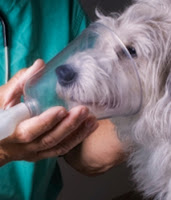Asthma is characterized by chronic problems with the respiratory system, and just like humans, cats and dogs are susceptible to asthma. It generally affects cats more frequently than dogs. Similarly to humans, asthma in pets can be triggered by environmental factors such as a change in season. It can be challenging to determine the exact cause of the asthma, but the most frequent culprits are grass, dust, pollen and smoke.
It can also be difficult to tell if your pet is actually suffering from asthma, as it is often misdiagnosed. For instance in cats, the coughing up of hairballs are often mistaken for asthma. While it may be difficult to find the triggers of the asthma, it will be well worth it. For cats, many times the dust from their litter can be the cause, or even the chemicals you use around the house. If you can reduce the amount of exposure your pet has to the allergen you can greatly increase the well-being of your pet.
 Symptoms of asthma in pets can include:
Symptoms of asthma in pets can include:Coughing
Wheezing
Trouble breathing
Excessive panting (for dogs)
Blue coloration of gums or tongue
Weight loss
Pet asthma can be very troublesome for both you and your pet. But rest assured there are solutions, with a little time and effort you can have your pet feeling better in no time.
 Home Treatment
Home TreatmentPreventive measures include:
• Avoid smoking around the dog
• Keep the dog away from freshly cut grass
• Keep the dog away from moldy places such as basements or attics
• Vacuum and dust regularly if the dog lives indoors
• Use humidifiers or air purifiers in the house
Effective herbs, according to Natural Dog Asthma Remedies website, may include:
• Mullein and licorice root to help coughing
• Echinacea and Oregon grape to help strengthen the immune system
If you think your dogs still have asthma problem, make sure to visit your vet as soon as possible.



No comments:
Post a Comment